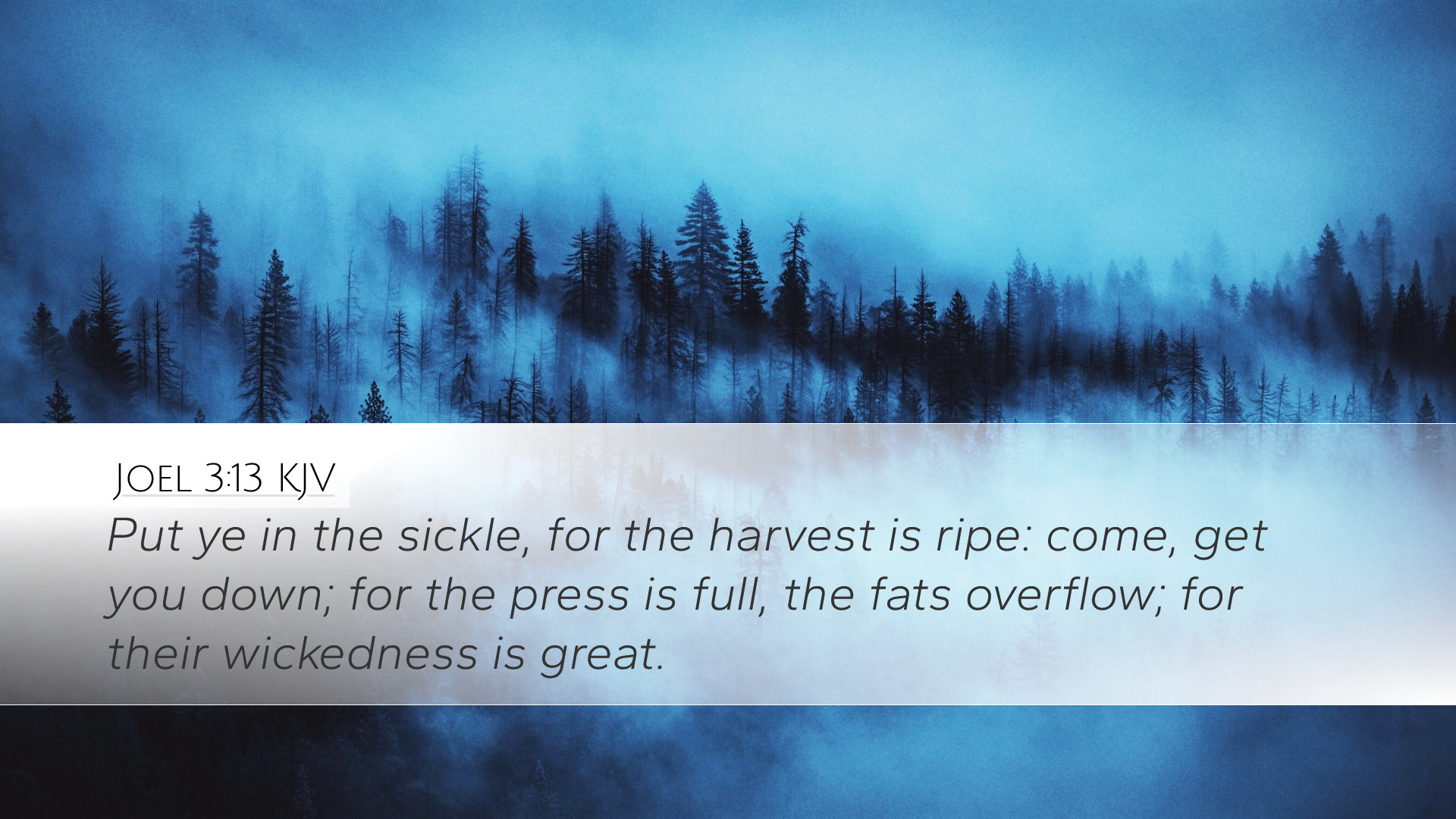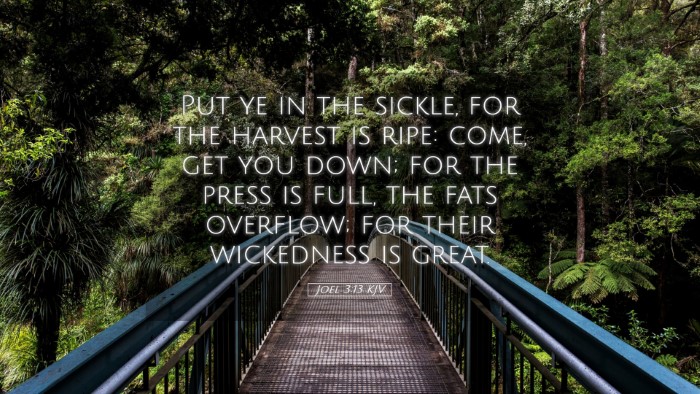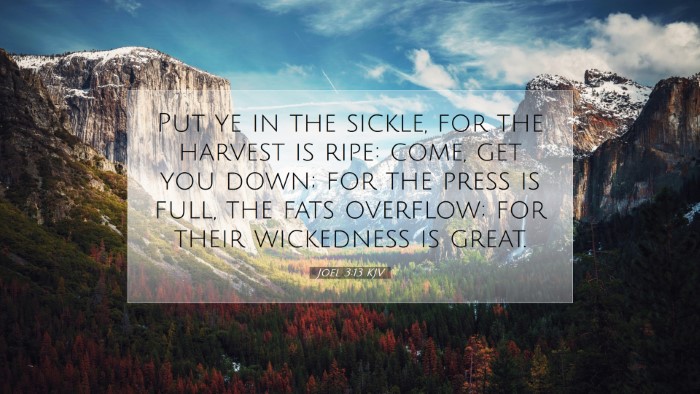Old Testament
Genesis Exodus Leviticus Numbers Deuteronomy Joshua Judges Ruth 1 Samuel 2 Samuel 1 Kings 2 Kings 1 Chronicles 2 Chronicles Ezra Nehemiah Esther Job Psalms Proverbs Ecclesiastes Song of Solomon Isaiah Jeremiah Lamentations Ezekiel Daniel Hosea Joel Amos Obadiah Jonah Micah Nahum Habakkuk Zephaniah Haggai Zechariah MalachiJoel 3:13
Joel 3:13 KJV
Put ye in the sickle, for the harvest is ripe: come, get you down; for the press is full, the fats overflow; for their wickedness is great.
Joel 3:13 Bible Commentary
Commentary on Joel 3:13
Verse Text: "Put ye in the sickle, for the harvest is ripe: come, get you down; for the press is full, the fats overflow; for their wickedness is great."
Introduction
In this passage, the prophet Joel portrays a vivid picture of divine judgment and harvest. The imagery speaks to both the impending destruction of the wicked and God's call for His people to prepare for what is to come. This commentary aims to explore the theological significance and implications of Joel 3:13 by synthesizing insights from notable public domain commentaries.
Contextual Analysis
The book of Joel is primarily concerned with the themes of judgment, repentance, and salvation. The third chapter reaches the climactic point of prophecy concerning the Day of the Lord. Joel emphasizes a stark duality between the fate of the righteous and the wicked, urging the nation to recognize the severity of God’s impending justice.
Historical Background
Joel's prophecy is set against the backdrop of national crisis, often interpreted as a locust plague or foreign invasion that serves as a metaphor for spiritual decay. The call to action, “Put ye in the sickle,” indicates both urgency and the necessity of divine justice. Albert Barnes notes that the harvest symbolizes the gathering of nations for judgment, suggesting a cosmic scale to God’s retributions.
Harvest Imagery
In agrarian societies, the harvest was a significant period of joy and labor but also of accountability. The sickle, a tool for harvesting, signifies a readiness to reap what has been sown. Matthew Henry emphasizes that God’s people must be prepared to reap spiritual fruits, while Adam Clarke remarks on the ethics of this "harvest," indicating a time of impending reckoning for nations due to their iniquities.
Theological Implications
The verse serves as an admonition regarding divine justice. The imagery of "the press is full" and "the fats overflow" poignantly reflects that judgment is not only imminent but that the measure of wickedness is complete. This fullness indicates that the patience of God has reached its limit, emphasizing the moral order to which God holds nations accountable.
Human Responsibility
There is a profound call for human responsibility in this text; the imagery compels readers to connect their actions with their outcomes. Barnes highlights that the "harvest" serves as a metaphor for personal accountability, urging believers to reflect on their spiritual state and societal contributions. The ultimate call to action emphasizes that each individual must acknowledge their participation in fostering righteousness or in compounding wickedness.
Judgment and Mercy
While this passage reflects God’s judgment, it also alludes to the concept of mercy interwoven throughout the text. The invitation to harvest implies that there is still time for redemption, echoing themes of repentance found throughout the prophetic literature. Clarke posits that even amidst judgment, God extends a hope for renewal through repentance and restored relationships.
Lessons for Today's Church
Joel 3:13 holds profound lessons for pastors, students, theologians, and scholars today. The themes of readiness, accountability, and divine justice are pertinent to contemporary Christian thought and practice.
Spiritual Readiness
The metaphor of harvest invites believers to consider their spiritual readiness. The church is called to prepare its members for the return of Christ, ensuring that they are engaged in evangelism and discipleship. Henry suggests that the faithful should not be complacent but rather vigilant, preparing themselves and others as the Day of the Lord approaches.
Call to Accountability
Church leaders are urged to drive home the message of accountability within their congregations. Addressing sin and promoting righteousness is essential for the health of any community of faith, as noted by Clarke. The overflow of the press and fullness of fats can serve as a vivid metaphor for the state of the spiritual lives of congregants—healthy or at risk of decline.
Hope for the Wicked
Even amidst the stark warnings of judgment, there is always room for repentance and restoration. The church must communicate that while God will judge nations and individuals for their wickedness, His mercy is equally present for those who turn toward Him. This duality can be a powerful tool for evangelism and holistic ministry practices.
Conclusion
Joel 3:13 encapsulates the essence of prophetic warning, reflecting divine retribution while also calling believers to a deeper understanding of their roles as agents of God’s justice and mercy. As pastors, students, and scholars ponder these truths, the challenge remains clear: to cultivate a community that actively seeks righteousness and prepares for the fulfillment of God's promises.


